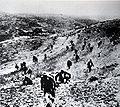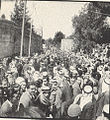Abdul Qadir al-Husayni
Abd al-Qadir al-Husayni عبد القادر الحسيني | |
|---|---|
 Portrait | |
| Birth name | Abd al-Qadir al-Husayni |
| Born | 1907 Jerusalem, |
| Died | 8 April 1948 (aged 40–41) Al-Qastal, |
| Allegiance | Palestine's Arab irregular forces |
| Service | Army of the Holy War |
| Years of service | 1936–1948 |
| Battles / wars | 1936–39 Arab revolt in Palestine 1947–48 Civil War in Mandatory Palestine |
| Relations | Musa al-Husayni (father) Faisal Husseini (son) |
Abd al-Qadir al-Husayni (Template:Lang-ar), also to be spelled Abd al-Qader al-Husseini (1907 – 8 April 1948) was a Palestinian Arab nationalist and fighter who in late 1933 founded the secret militant group known as the Organization for Holy Struggle (Munathamat al-Jihad al-Muqaddas),[1][2] which he and Hasan Salama commanded as the Army of the Holy War (Jaysh al-Jihad al-Muqaddas) during the 1936–1939 Arab revolt and during the 1948 war.
Family and early nationalist career

Husayni was born to the prominent and influential al-Husayni family of Jerusalem, son of Musa al-Husayni. He lost his mother after a year and a half of his birth. Afterward his grandmother took care of him and his seven other siblings, three girls, four boys. Foud a farmer, Rafiq an Engineer, Sami a Teacher and Farid an accountant.
His father, Musa al-Husayni, held some high positions in the Ottoman State, working in Yemen, Iraq, Najd and Constantinople (Later Istanbul) in addition to Palestine. Because of his great services to the Ottoman state, the government granted him the title (Pasha). He was mayor of Jerusalem (1918–1920), then was dismissed as mayor by the British authorities and became head of the nationalist Executive Committee of the Palestine Arab Congress from 1922 until 1934. Musa was the first to raise his voice in the face of the British Mandate, and the first to call the people of Palestine to protest, demonstrate, and declare discontent and anger against the Balfour Declaration. He participated in many demonstrations, the last of which was the large demonstration in Jaffa on 27th October 1933, in which he was severely beaten with batons by the English soldiers, after which he remained bedridden for days, until he died in 1934.
Abd al-Qadir completed his secondary education in Jerusalem with distinction and then joined the College of Arts and Sciences at the American University of Beirut, but did not continue his studies there. He the joined and graduated in chemistry at the American University in Cairo and organized the Congress of Educated Muslims.
Initially, he took a post in the settlement department of the British Mandate government but eventually moved to the Hebron area during the 1936–1939 Arab revolt in Palestine to lead the struggle against the British. A member of the Palestine Arab Party, he served as its secretary-general and became editor-in-chief of the party's paper Al-Liwa'[3] and other newspapers, including Al-Jami'a Al-Islamiyya.
Abd al-Qadir married in 1934 and fathered Faisal al-Husayni (17 July 1940 – 31 May 2001), the founder and leader of Arab Studies Society, head of Fatah organization in the West Bank and Palestinian Authority Minister for Jerusalem Affairs.
Battle of al-Qastal
In 1938, Husayni was exiled and in 1939 fled to Iraq where he took part in the Rashid Ali al-Gaylani coup. He moved to Egypt in 1946, but secretly returned to Palestine to lead the Army of the Holy War in January 1948. Husayni was killed while personally reconnoitring an area of Qastal Hill shrouded by fog, in the early hours of 8 April 1948.[4] His forces later captured al-Qastal from the Haganah, which had occupied the village at the start of Operation Nachshon six days earlier with a force of about 100 men.[5] They retreated to the Jewish settlement of Motza.[6] Palmach troops recaptured the village on the night of 8–9 April, losing 18 men in the attack;[7] most of the houses were blown up and the hill became a command post.[8][9] Huseyni's death was a factor in the loss of morale among his forces.[10]
-
Abdul Qader al-Husseini with his troops prior to the January 1948 attack on Kfar Etzion. Photograph taken by a Palmach spy
-
Palestine irregulars under Qader al-Husseini about to attack al-Qastal 7-8 April 1948
-
Abdul Qader al-Husseini with his officers on the day he was killed
-
Mourners at Huseyni's funeral gather near Sheikh Jarrah
See also
Footnotes
- ^ Swedenburg, 1999, p. 150
- ^ Sayigh, 2000, p. 35
- ^ Levenberg, 1993, p. 6.
- ^ Morris, 2008, p.123.
- ^ Morris, 2003, p. 234.
- ^ Dana Adams Schmidt, "Arabs Win Kastel But Chief is Slain", The New York Times, 9 April 1948, p. 8 (A brief biography and account of the battle).
- ^ "דף הבית". Archived from the original on 1 June 2012. Retrieved 23 November 2010.
- ^ Benveniśtî, 2002, p.111.
- ^ Morris, 2003, p. 235.
- ^ Time, "War for Jerusalem Road"
References
- Benveniśtî, Mêrôn (2002). Sacred Landscape: The Buried History of the Holy Land Since 1948. University of California Press. ISBN 0-520-23422-7
- Levenberg, Haim (1993). Military Preparations of the Arab Community in Palestine: 1945-1948. London: Routledge. ISBN 0-7146-3439-5
- Morris, Benny (2003). The Birth of the Palestinian Refugee Problem Revisited. Cambridge University Press. ISBN 0-521-00967-7
- Morris, Benny (2008). 1948. Yale University Press. ISBN 978-0-300-15112-1
- Robinson, Glenn E. (1997) Building a Palestinian State: The Incomplete Revolution. Indiana University Press. ISBN 0-253-21082-8
- Sayigh, Yezid (2000). Armed Struggle and the Search for State: The Palestinian National Movement, 1949-1993. Oxford: Oxford University Press. ISBN 0-19-829643-6
- Swedenburg, Ted (1999). The role of the Palestinian peasantry in the Great Revolt (1936–39). In Ilan Pappé (Ed.). The Israel/Palestine Question (pp. 129–168). London: Routledge. ISBN 0-415-16947-X
External links
- Handwritten letter by Abd al-Qadir al-Husayni
- PASSIA
- Abd al-Qadir al-Husayni's Koran http://www.ynetnews.com/articles/0,7340,L-3406966,00.html
- Biography by Hasan Afif El-Hasan
- "War for Jerusalem Road". Time. 19 April 1948. Archived from the original on 30 September 2007. Retrieved 31 October 2009.
- 1907 births
- 1948 deaths
- Al-Husayni family
- The American University in Cairo alumni
- Palestinian Arab nationalists
- Palestinian military personnel
- Palestinian nationalists
- Palestinian people of the 1948 Arab–Israeli War
- People from Jerusalem
- Rebel commanders of the 1936–1939 Arab revolt in Palestine
- 20th-century Palestinian people




